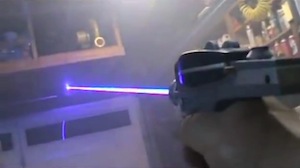Home
A comprehensive resource for safe and responsible laser use
Poland: Scientific paper says laser toy is misclassified, 4x legally required power
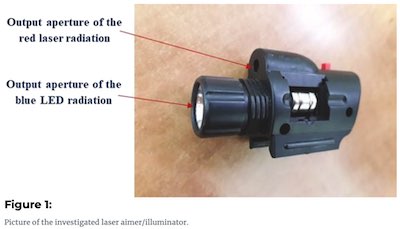
The paper examined the red laser's output and found it was 1.7 milliwatts. This is four times the Class 1 limit of <0.39 mW, and is 1.7 times the Class 2 limit of <1 mW. The laser should have been classified as Class 3R (<5 mW limit).
The author notes that according to the European standard EN 62115:2020, and guidance from Public Health England, laser toys should be Class 1. At four times the Class 1 limit, this toy's "radiation may be hazardous, especially when looking into the beam for long periods."
From Mlynczak, Jaroslaw. "Laser toys fail to comply with safety standards – case study based on laser product classification" Advanced Optical Technologies , no. (2021). https://doi.org/10.1515/aot-2020-0072
COMMENTARY FROM LASERPOINTERSAFETY.COM
We do not dispute Mlynczak's technical findings. However, there are some misleading or false statements in the paper that we would like to address.
- An erroneous title; it should be "Laser toy fails to comply…" The case study is not about "toys" plural. It covers only one sample of one toy rifle which had a laser aiming device that was found to be misclassified.
- Stating that the toy laser's output power (1.7 mW) is illegal, when it may have been legal or close to legal (within 0.7 mW) at time of sale.
- Calling the laser's light output "radiation" 14 times and never using the more precise term "light," thus giving a misleading impression the hazard might be similar to that of X-radiation or nuclear radiation.
- Stating without any proof or reference that children "will usually try to look directly into the laser beam."
- Stating without any proof or reference that children "could have temporary disturbances of vision… lead[ing] to a tragedy."
- Stating without any proof or reference that there is such a thing as "hypersensitivity to laser radiation."
- Stating without any proof or reference that "the described laser toy… [is] easily available and [is] still sold as toys in many European states."
- Listing in the References studies claiming laser "toy" injuries, which actually were from standard, non-toy laser pointers.
Details are below:Click to read more...
US: 2 Watt "laser bongs" for sale
The laser beam is so intense it is a diffuse reflection hazard. The bong comes with 2 pairs of protective eyewear.
![]()
The founder of the company said in a November 2018 email to Mashable that the laser is not dangerous but can sting if you get your hand in it "kind of like a magnifying glass."
In addition to the 445 nm blue laser and protective glasses, the app-controlled bong also has a rotating bowl and color-changing LEDs.
The product has been in the works for some time. According to Gizmodo, a January 11 2018 Instagram video from Silicon Cali's founder demonstrated a prototype laser bong available for pre-order. On January 23 2018, he wrote on Instagram about shipping time: "It’s just dealing with the FDA regulation and all the other requirements for manufacturing and selling a high powered class4 laser product in the USA that take the time."
It is not known when the late fall 2018 version officially went on sale.
At the company's website, as of November 5 2018 there is no mention of FDA certification nor any picture of FDA-required warning labels, though there is a description of "turn key ignition." In the photo above, a small key can be seen inserted into the bottom of the bong. Federal law requires a key or similar lock-out device to prevent laser devices from being turned on by unauthorized users.
Laser bongs are a relatively old idea among persons interested in high tech and recreational drugs. A web search turns up a July 30 2009 post to Grasscity Forums, linking to a YouTube video of a prototype LaserBong (different product) made by the chief engineer of Wicked Lasers. The video is now unavailable at YouTube. Other YouTube videos still online show, for example, a June 4 2013 video of a person using a handheld blue laser to ignite bong material.
From Silicon Cali with additional reporting by Mashable and Gizmodo.
US: High-powered lasers can be obtained from inside a Christmas holiday laser projector
In a January 22 2018 Hackaday post, Tom Nardi purchased a “Home Accents Holiday Multi-Color Light Projector” from a hardware chain on clearance, marked down from $56 to just $14.
He removed the cover with four screws and found the parts inside used connectors instead of solder: “It’s like they wanted us to strip it for parts.”
The lasers were defocused inside. “…[A]t 3 meters the spots looked as large as dinner plates…. Once focused, it becomes pretty clear that these lasers are quite a bit more powerful than the <5 mW listed on the product’s warning sticker.”
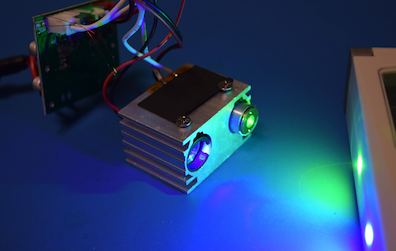
The green and blue laser diode modules inside the holiday projector
Nardi noted that the blue laser, when focused, was “easily able to burn pieces of paper and punch holes in black plastic.” He also estimated that the green laser was “at least twice as bright” as a laser pointer he owns that claims to be 50 mW: “…it certainly would not surprise me if they are both [green and blue] at least 100 mW.”
Nardi writes: “If your biggest take-away from this post is that the Home Depot is selling a 440 nm laser you can use to burn stuff, I certainly don’t blame you.”
From Hackaday. LaserPointerSafety.com has a page with more information, including measurements of the beam output of a Star Shower projector, here.
Commentary from LaserPointerSafety.com: In fairness to Home Accents, the FDA-required warning sticker has to do with the laser power of the unopened unit in its factory configuration. Class 3R (IIIa) laser projectors like this are not allowed in the U.S. to be over 5 mW output power. It may be that after going through the holographic diffraction grating that creates the stars, that the Home Accents projector meets Food and Drug Administration requirements for user access to laser light.
US: FDA recommends against using Laserworld and Ray Technologies laser projectors
Laserworld set up a special website, www.cdrh.info, with a statement and information from their viewpoint.
The International Laser Display Association published guidance for ILDA Members and others who are doing shows in the U.S. with Laserworld and RTI projectors.
US: FDA recalls certain X-Laser light show projectors
FDA listed the following actions:
X-Laser LLC will bring into compliance:
1. All purchasers and associated dealers of affected LLS projector models will be notified by mail and email of their failure to comply with the performance standard. The notification will follow the format and include the information required by 21 CFR 1003.21. Those that do not respond within 14 days will be notified a second time. Those not responding to the second attempt will be notified again every 6 months for the next 2 years. Non-responsive dealers will be ineligible for future orders.
2. All affected LLS projectors will be repaired by removing the auto and music modes from the dipswitch accessible settings, after which, these modes will only be accessible through the DMX connection. These actions, including transportation of the LLS projector, will be made free of charge.
3. All LLS projector models that X-Laser receives, regardless of purpose, will be checked for dipswitch accessible auto or music modes and repaired if needed.
4.Corrective actions will be completed within 120 days of receipt of this letter.
For further questions please call (866) 702-7768.
For additional details from X-Laser, click the “read more” link. Click to read more...
US: FDA issues warning about laser toys
FDA gave these examples of laser toys:
- Lasers mounted on toy guns that can be used for “aiming”;
- Spinning tops that project laser beams while they spin;
- Hand-held lasers used during play as “light sabers”; and
- Lasers intended for entertainment that create optical effects in an open room.
According to the Consumer Update, “Toys with lasers are of particular interest to the FDA because children can be injured by these products. Because they are marketed as toys, parents and kids alike may believe they’re safe to use.”
The FDA had tips for safe use, including:
- Do not aim at persons or animals
- Do not aim at any vehicle, aircraft or shiny surface; or persons playing sports
- Children’s toy lasers should be Class I.
- Children should not be allowed to own or use laser pointers. Pointers are not toys.
- Do not buy or use any laser that emits more than 5 milliwatts.
- See a health care professional in case of a known or suspected laser eye injury.
The FDA’s health warning was referenced in numerous news and publication sources over the 2017 holiday season.
From the FDA Consumer Update, “Laser Toys: How to Keep Kids Safe”. FDA also linked to a 2015 FDA YouTube video on laser pointer safety.
For background, LaserPointerSafety.com has a series of webpages about laser toys which begin with a summary here.
Worldwide: 3D printing creates mechanical "laser show" using a pointer
It works by putting a standard pen-type laser pointer between two cams. Cranking a handle turns the cams which bounce the laser pointer up/down and left/right to create projected patterns:
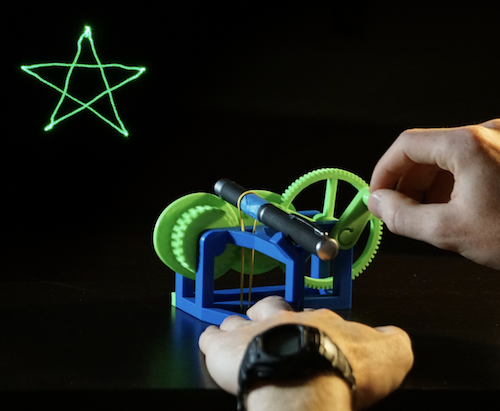
By using different cam shapes, different patterns can be projected:
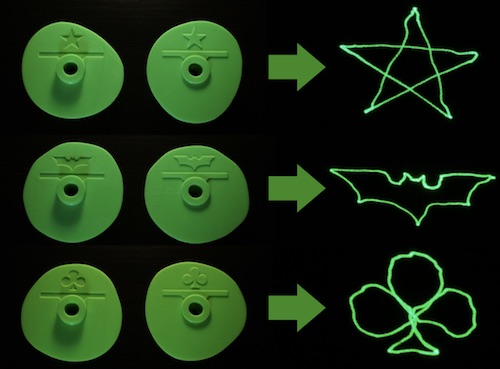
Instructions and plans are available online, including Thingiverse 3D printing files.
Stanford noted “At this point I think it is unlikely I will continue the project. But if I did, here’s what I could do:” He then listed adding blinds to make discontinuous patterns, making the device motor driven, and adding a web service to make it easier to create new cam patterns.
From Evan Stanford’s Hackaday.io page, posted in mid-June 2017
Worldwide: Star Wars drones feature aerial laser battles
The “Star Wars Battle Quads” can move at speeds of 40-50 mph, and have clear propellers on the bottom to help maintain the illusion of a Millennium Falcon, X-Wing, TIE fighter or speeder bike flying on its own.
According to the manufacturer, Propel, up to 24 drones can have a laser battle simultaneously. A publicity photo shows laser beams clearly visible in a smoky environment:
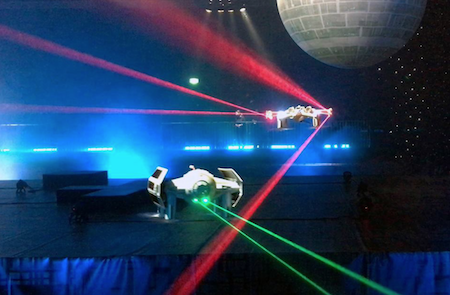
Below is a freeze-frame from a Propel video that shows the drones (upper left corner) flying in a public demonstration. The circles show where the laser beams are shooting onto an audience.
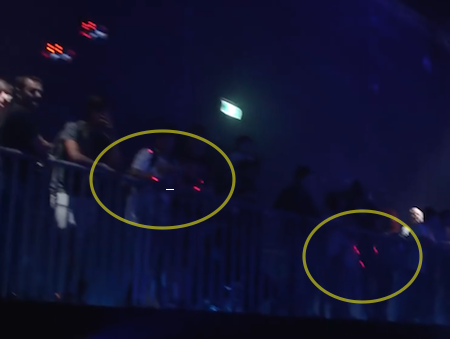
According to the Verge, “When a ship is hit by a laser from an opposing ship, its paired controller … shakes in the pilot’s hands. After three direct hits, the drone will slowly spiral to the ground the game is over. Although the prototypes weren’t ready for one of these battles when we saw them, the lasers alone were pretty striking.”
The caption of this photo from the Verge states that the lasers are “Around the strength of a laser pointer.” Empire vehicles have green lasers, Rebellion vehicles have red.
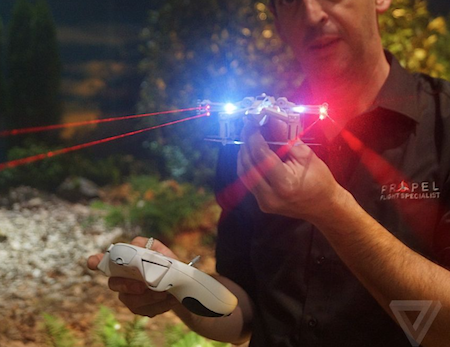
The cost is reported to be between $200-$400.
From Wired, Engadget and the Verge. Freeze-frame from a video in a PC Mag article.
US: UPDATED - FDA reminds consumers of laser pointer hazards
This is an update to a similar warning issued December 16 2010. It contains more specific guidance about how to tell whether a handheld pointer may be over the U.S. limit of 5 mW for a laser sold as a “pointer” or for pointing purposes.
Also, the 2015 version includes details about how to report potential laser injuries to FDA’s MedWatch medical device reporting system, and what information to include in the MedWatch report.
The full text of the FDA Safety Communication is below; click the “Read More…” link.
From U.S. FDA: December 22 2015 safety communication, and December 16 2010 safety notification
UPDATED February 19 2015 — The FDA also produced a video, entitled “Laser Pointer Safety”. The 3 1/2 minute presentation shows some of the hazards of laser pointers. It also gives recommendations on how to select and safely use laser pointers. From the FDA’s YouTube channel.Click to read more...
US: Hobbyist builds 40 watt laser "shotgun"
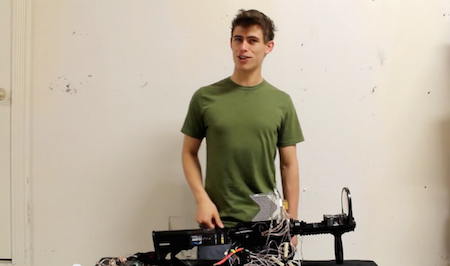
The hobbyist, with the username “styropyro,” wrote on YouTube: “Just finished building my 40W(!!!) laser shotgun!!! The output of this laser is complete insanity, and is made up of 8 parallel 5W laser beams totaling to 40W. The parallel beams are manipulated with lenses, sort of like how a choke modifies the spread of a shotgun blast. The massive diode array is powered by a huge lithium polymer battery pack (capable up dumping 250A) and the laser array is regulated by a whopping 24 LM317 drivers. This is definitely the craziest thing I have ever built, but I hope to beat this invention with something even crazier before too long.”
In the video narration, he said “I just built something so crazy that I’m almost afraid to use it” and “There is no, no good reason for anybody to own something this powerful. But because it wasn’t illegal for me to build, I decided to build it anyway.” The video then goes on to show the beam popping balloons, and burning paper, a ping-pong ball, and other materials.
Styropyro had previously posted other videos with titles such as “Homemade Lightsaber!?! MASSIVE 3W Handheld Laser Torching Stuff!!”, “My Homemade 6W Laser Sword!!!” and “Homemade Death Ray Laser DRONE BOT!!! Remote Controlled!!!”
From Gizmodo. Thanks to Patrick Daniel Murphy for bringing this to our attention via Reddit.
Northern Ireland: PHA warns against buying laser pointers as children's Christmas presents
Eibhlin McLoone, a consultant ophthalmologist with the Belfast HSC Trust, has treated several of the children and said the devices "are not toys".
"Sadly, I have seen children who have eye damage because they have played with a laser pointer and unfortunately once the eye has been damaged by a laser pen the damage is irreversible," she said.
"Due to the risk of permanent visual impairment, it is vital that the public is aware of the risks associated with laser pointers and that these devices are never viewed as toys."
Ms McLoone added: "Unfortunately, once the laser burn has happened there is no treatment available to reverse it."
From the Belfast Telegraph
US: FDA issues guidance on lasers in toys; wants Class 1 only
In addition to toys with visible beams that are dimmer than laser pointers, the other type of children’s Class 1 laser products are those that have internal, inaccessible lasers. For example, the laser inside a CD or DVD player device is often Class 3B — well above 5 mW. But because the beam cannot be accessed under normal conditions, the entire device is Class 1.
What laser toy products are included
FDA’s guidance is for “children’s toy laser products”, defined by the agency as “a product primarily used as a toy that is manufactured, designed, intended or promoted for novelty or visual entertainment use by children under 14 years of age.” It does not include “laser products that are used in professional or academic settings that may be used by children (for example, laser printers, CD players, educational and science kits).”
To determine if a laser product is a toy, FDA takes into account factors such as the promotion and product graphics (for example, if children are shown playing with the product), the location of sales such as toy stores or websites, and whether features or the nature of the product may indicate it is intended for children.
The agency gives examples of children’s toy laser products:
- Lasers mounted on toy guns that can be used for “aiming”
- Spinning tops that project laser beams while they spin
- Hand-held lasers used during play as “light sabers”
- Dancing laser beams projected from a stationary column with bright colors or pictures on the box that might appeal to children
- Lasers intended for entertainment that create optical effects in an open room with bright colors or pictures on the box that might appeal to children.
Worldwide: Review of laser "stars" projector; question about aircraft interference
The reviewer, Bill Kuch, says the green-only version contains a Class IIIa laser that uses diffractive holographic optics to create the beams. According to the instruction pamphlet, “Each individual laser beam is less than 5 mW, which is about the same as an average laser pointer.”
He then talks about testing the unit indoors and outdoors. Kuch said that after aiming at the tree canopy around his cabin in the woods, his neighbors came out, commented positively, and asked where they could purchase one.
In the final paragraph, he says when he pointed the projector up into the trees, “that begs the question: could it interfere with aircraft flying overhead?”
Review of the Viatek Night Stars Landscape Lighting from the Gadgeteer.
Click to read more...
EU: Consumer lasers to be restricted to Class 2 (1 mW) maximum within 24 months
(For reference, the full title of the 5 Feb 2014 document is 2014/59/EU: Commission Decision of 5 February 2014 on the safety requirements to be met by European standards for consumer laser products pursuant to Directive 2001/95/EC of the European Parliament and of the Council on general product safety Text with EEA relevance. The document is online here.)
Timeframe and who is affected
The EU decision does not appear to directly affect laser product sales or access at this time (early 2014). Instead, it applies to European safety standards "pursuant to Directive 2001/95/EC”, the General Product Safety Directive. These standards would need to be updated to conform with the 5 Feb 2014 EC decision. The expected time is about 24 months.
A member of the IEC Technical Committee 76, the group which sets laser equipment safety standards, told LaserPointerSafety.com that "the standardization organizations are about to be requested to produce a new standard or amend an existing one, implementing/specifying such new requirements. The deadline for an amended or new standard seems to be within 24 months…. For now, it seems that the General Product Safety Directive, the Low Voltage Directive, and the Radio & Telecommunications Terminal Equipment Directive are the targeted ones.”
Once one or more standards are updated to meet the requirements of the 5 Feb 2014 EU decision, the new requirements would then be legally enforceable in the European Union.
Click to read more...
US: Famous DJ explains why he had to have a 2 watt laser pointer
Avicii answered “I just bought a really awesome laser pointer. It's two watts, so it's five hundred times stronger than those regular green laser pointers. If you were standing on top of the Empire State Building with it, you could see all the way to Philadelphia. It's dangerous. You can't really play with it. You need to use goggles or you could go blind. But I saw some YouTube videos where it set stuff on fire, and I was like yes. It cost $1,500. That's not too bad for such an amazing invention.”
From Rolling Stone
UK: Toy helicopters use real lasers in a dog fight
A video showing the “AirTerminators Super Combat Helicopters” in January 2014 at the London Toy Fair shows an operator getting a brief laser hit just below his eye. The laser is said to be Class 1; if so, such a brief exposure would not be considered harmful according to safety guidelines.
However, it is not recommended for children to play with lasers. Further, it is unknown if the laser remains operational even if the helicopter is stationary or is handheld instead of free flying.
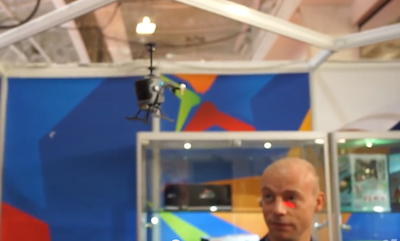
The helicopter is in the middle top of the photo. A red line can be seen just under the operator’s eye. This is the path of the laser from an opposing helicopter as it went across his face during the video frame. This can be seen at 34 seconds into a YouTube video of the demonstration.
From Pocket-Lint. The video is on YouTube.
US: Lasers being used to burn string in arcade games (to get prizes to drop)
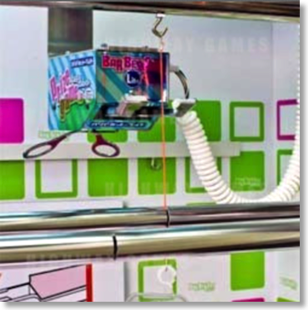
Namco America sent the notice to arcade operators of BarBerCut Lite and other hanging prize type games in May 2010, after powerful handheld laser pointers became available online at relatively low cost. Namco noted that “a criminal armed with one of these can steal a number of prizes from a merchandiser in a short period of time.”
White cords and zip ties are recommended, since they reflect most of the laser’s power. In 2009, Namco changed from black and colored fasteners, which absorb the laser’s light.
From Vending Times
US: Think Geek introduces toy shark with frickin' laser on its head
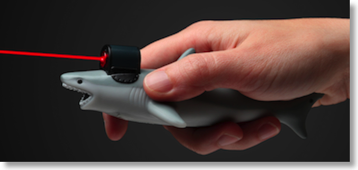
The gadget references the Austin Powers spy spoof movies. In 1997’s International Man of Mystery, the character Dr. Evil asks for “frickin’ sharks with frickin’ laser beams attached to their heads.” In 2002’s Goldmember, his son Scott actually develops the sharks:
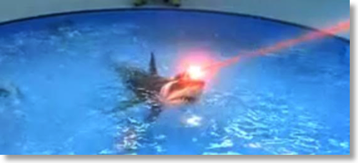
From Think Geek by way of Gizmodo. See also our May 2012 story about a laser pointer attached to a (real) shark’s fin, done for publicity purposes.
US: FDA warns parents of dangers of laser toys; issues draft guidance
In an August 6 2013 press release and Consumer Health Information article, FDA warned parents that lasers operated unsafely can cause serious eye injuries and even blindness. FDA said injuries from lasers can go unnoticed for days or weeks since there is no pain. But vision can slowly deteriorate over time, eventually causing permanent eye damage.
FDA gave the following as examples of children’s toy laser products:
- Lasers mounted on toy guns that can be used for “aiming”;
- Spinning tops that project laser beams while they spin;
- Hand held lasers used during play as “light sabers”;
- Dancing laser beams projected from a stationary column; and
- Lasers intended for entertainment that create optical effects in an open room.
Interestingly, the FDA’s press release and article gave tips on safe usage, including not aiming at car drivers or sports players -- but did not say that it is unsafe and illegal to aim at aircraft.
On August 7 2013, FDA issued draft guidance for industry on minimizing the risk of lasers in children’s toys. Comments are invited within 90 days of the Federal Register publication of the guidance, or by November 4 2013. The draft guidance is reprinted below.
Click to read more...
US: FDA proposes amending Federal laser manufacturer regulations
The proposal was issued in the Federal Register on June 24 2013. The public may send comments to FDA until September 23 2013. FDA will then evaluate the comments, make any changes as a result, and at a future date will put the amendments into effect.
For consumer lasers, the most significant proposal is to create a new category of specific purpose lasers, “children’s toy laser products.” FDA says these could include lasers intended for creating entertaining optical effects, dancing laser beams projected from a stationary column, spinning tops which project laser beams, or lasers mounted on toy guns for “aiming.” FDA defines such toys as “a product that is manufactured, designed, intended or promoted for use by children under 14 years of age.”
The laser inside such a toy would be restricted to Class I (less than 1 mW for visible light). This is because FDA is concerned that if the toy were broken or disassembled, a higher power laser could harm a child.
Click to read more...
US: Man builds a replica Star Trek phaser
This is not the first time such a project has been done. In 2007, Kip Kedersha (“Kipkay”) posted a YouTube video showing how he bought a surplus Playstation 3 laser diode for $45 and a Star Trek toy for $30, in order to make a laser-emitting phaser.
A Huffington Post story has the 2012 video, as well as links to earlier videos and detailed build instructions.
From Reddit via the Huffington Post
Israel: "Laser dreidel" toy's safety questioned
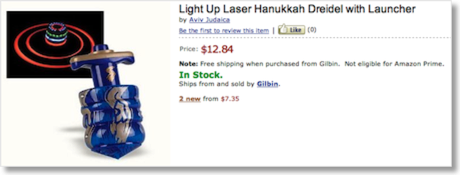
This dreidel projects two laser dots, creating two circles when spun (insert photo). The listing above is from the U.S. Amazon.com website.
The news story points out that laser pointers can cause permanent vision damage. In addition, the story says the laser is sold “without a filter,” probably meaning without an infrared (IR) filter. IR light can damage the retina -- like visible light -- but also could damage the cornea.
.
